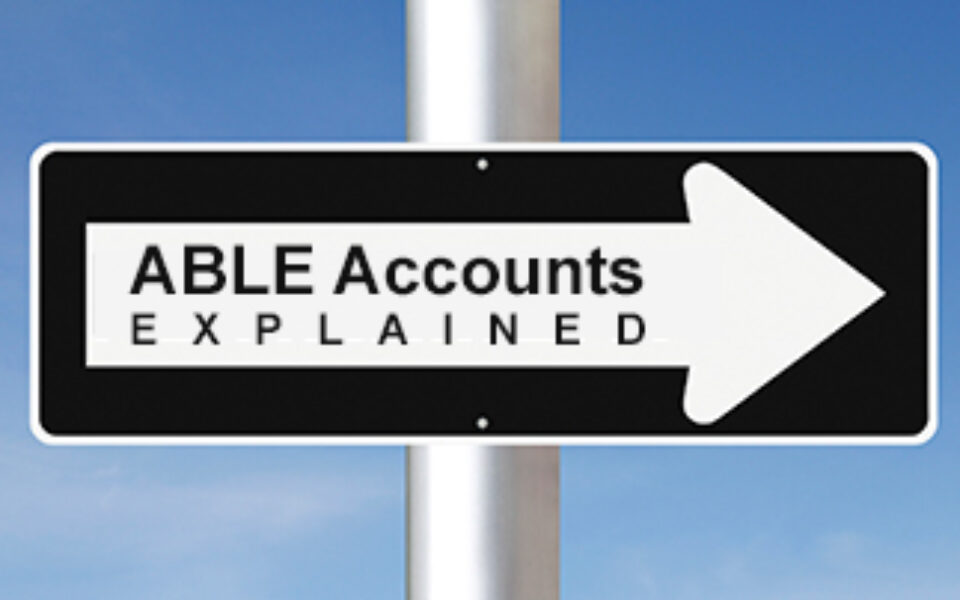Achieving a Better Life Experience Act (ABLE) of 2014

In addition to the Tax Extender Bill which was approved in December 2014, the President signed the Achieving a Better Life Experience Act (ABLE) of 2014 which will be effective in 2015.
ABLE was sponsored by Senators Bob Casey (D-PA) and Richard Burr (R-NC). Its purposes are:
- To encourage and help the saving of private funds to support individuals with disabilities to maintain independence and quality of life; and
- To provide a secure fund for disability-related expenses of beneficiaries with disabilities to supplement (but not supplant) benefits provided by private insurance, Social Security disability benefits, Medicaid benefits, beneficiary employments and other sources.
While the law takes effect for 2015, ABLE accounts will not be able to be set up immediately. Regulatory guidance is required and states must set up a qualified ABLE program first.
Until the new law, families with disabled children were faced with problems in providing benefits for them. Federal means-tested programs have income and asset limits so that they apply only to those with limited income and resources. Supplemental Security Income has $2,000 asset and $721 monthly income limits. Additionally, countable income under the $721 limit can reduce the SSI benefit. There are certain rules where assets not directly owned are considered to be owned by the disabled person for these tests. Furthermore, SSI eligibility can confer rights under Medicaid in many states.
The new law amends the Internal Revenue Code to create a new tax-advantaged savings programs (a qualified ABLE program) and accounts held by an eligible individual (ABLE account).
A qualified ABLE program must established and maintained by a state, or an agency or instrumentality of the state which
- Permits establishment of a single ABLE account for a designated beneficiary. (A later ABLE will not be treated as a qualified account)
- Permits ABLE account to be established only for a beneficiary who is a resident of either the state maintaining the program (“program state”) or a contracting state which has not established its own qualified ABLE program but has entered into a contract with a program state.
- Limits contributions from all persons (which must be made in cash) to the account to $14,000 a year (the annual present value gift tax contribution). For gift tax and generation skipping tax purposes, a contribution to an ABLE is treated as a completed gift of a present interest in property.
- A state may establish a cumulate account limit. The account can grow in value from investments but cannot receive additional contributions until the value of the account drops below the limit.
- The “eligible individual” for whom the account is established became disabled before reaching age 26. If the person is receiving SSI or Social Security Disability Insurance, he/she is qualified. If such benefits are not being received, a person can qualify under a “certification” process based on a doctor’s diagnosis. An ABLE account will not apply to individual becoming disabled later in life. However, it is possible that regulations can provide that certain conditions occurred before 26 even it there are limited or no effects exhibited at that date.
The account is allowed to grow tax-free. If distributions from an ABLE account do not exceed the designated beneficiary’s “qualified disability expenses” (e.g. education, housing, transportation, employment training and support, health, prevention, wellness, financial management and administrative services, legal fees, oversight, funeral and burial expenses, assistive technology and personal support services), then no portion of the distribution is treated as income. However the excess is treated as income and is subject to a 10% penalty. Some exceptions apply to the 10% penalty.
The contributors receive no deduction for the contribution to the ABLE account, so a distribution has a portion allocable to basis and the balance is subject potentially subject to tax. The qualified disability expenses are allocated pro rata to the basis and income portions.
Upon the designated beneficiary’s death, “qualified disability expenses” will first be paid. Then the balance in the ABLE account paid under a state Medicaid plan after establishment of the account will be payable to the state as a creditor, but only if the state files a claim for payment.
Other ABLE Benefits:
- Amounts in an eligible individual’s ABLE account, including contributions to and distributions to pay qualified disability expenses, are generally disregarded in determining eligibility for any federal means-tested program. However for Supplemental Security Income (SSI), distributions for housing and ABLE account balance in excess of $100,000 are considered a resource of the designated beneficiary. This can cause suspension but not termination of benefits. The law provides for states to submit reports to the Commissioner of Social Security relating to these accounts.
- Limited bankruptcy protection for funds placed into an ABLE account. The amount protected depends upon the length of time between the contribution and the filing of the bankruptcy petition where the designated beneficiary of the account was the debtor’s child, stepchild, grandchild, or stepgrandchild for the tax year in which the funds were placed into the account.
Within six months from date of enactment of the law, IRS is directed to develop regulations or other guidance in conjunction with the Commissioner of Social Security relating to disability certifications and disability determinations.
Qualified Tuition Programs
IRC Section 529 is also amended to permit contributors to or beneficiaries of a qualified tuition program to direct the investment up to two times in a calendar year. The law does not provide the right for any investment direction, but IRS has permitted one direction per year.
If you have any questions about the ABLE program or any other Tax Extender item, please contact your Marcum Tax Advisor.

















